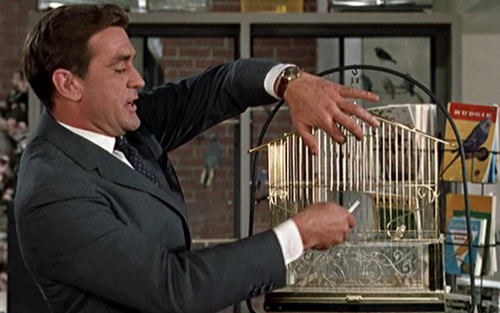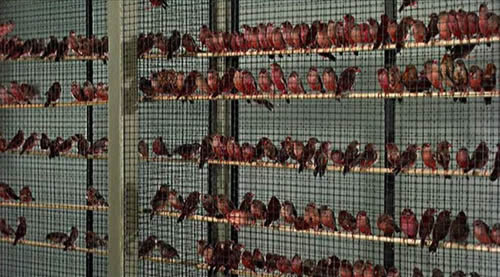Melanie's Coercion by the Birds
Back in Your Gilded Cage, Melanie Daniels: Gender Difference and Misogyny in Hitchcock's The Birds

Far from being a simple Cold War parable or work of environmental activism, The Birds (1963) presents the viewer with Alfred Hitchcock’s portrayal of the encroaching Sexual Revolution and the resulting shifts in gender roles. It is evident from Hitchcock’s other films, like Vertigo or North by Northwest, that he was enamored by the ideals of the cult of domesticity and separate spheres of inhabitation for men and women that were glamorized by 1950’s sitcoms like “Leave it to Beaver” or “Ozzie and Harriet.” However, by the beginning of the 1960’s, the Ward and June Cleaver gender roles, that Hitchcock so revered, were beginning to come apart at the seams as a result of the Sexual Revolution. All at once a giant controversy began to envelope the sexual practices of Americans. Beginning with the legalization of “the pill” by the FDA in 1960, and continuing with the sensationalism of high-profile Supreme Court cases like Poe v. Ullmann and Griswald v. Connecticut, people across the country, tired of the sexual repression of the 1950’s, began to openly discuss the use of contraceptives and eventually issues like abortion.[1] With this newfound sexual liberation, however, many women began to grow dissatisfied with their societal roles. Although the actual abandonment of the cult of domesticity by many women began with the United State’s entry into World War II, women, throughout the sixties, began to openly contest the obstacles they faced in the workplace and the stereotypes that were imposed upon them by men trying to keep them from breaking into traditionally “male spheres”.

In The Birds, Hitchcock presents the viewer with such a woman: Melanie Daniels. Hitchcock’s misogynist tendencies are made increasingly clear throughout the course of the film in the way in which Melanie is ostracized and punished for her deviance from the ideals of the older generation. Ultimately, two options are presented to Melanie amidst the chaos of the bird attacks: become the ideal submissive woman, like Lydia, or remain strong and independent, like Annie, and face the continued wrath of the birds. By placing Melanie in traditionally masculine spheres, contrasting the wardrobes and physical appearances of each of the film’s three female leads, and ascribing different characters with diegetic “masculine” and “feminine” music, Hitchcock crafts a work in which the birds can be seen as a metaphor for traditional, conservative morality forcing a deviant back into her proper position and in which diegetic sound represents the imminent threat of burgeoning feminism.